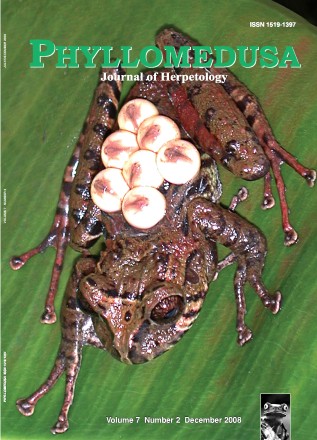The effect of kinship on intraspecific competition in larvae of the poison frog Ameerega bassleri (Anura, Dendrobatidae)
DOI:
https://doi.org/10.11606/issn.2316-9079.v7i2p121-126Keywords:
Anura, Dendrobatidae, Ameerega bassleri, heterogeneous advantage, inclusive fitness, kin selection, PeruAbstract
According to inclusive fitness theory, cooperation between related individuals should ameliorate the effect of intraspecific competition. However, close relatedness is also thought to increase similarity between individuals and therefore increase the risk of exploitative competition. Studies of the effects of kinship in larval amphibians have produced mixed results concerning these two hypotheses. We examined the effect of kinship on the mean and variation of mass after 30 days of growth in groups composed of either pure siblings or a mixture of five different sibships in a species of poison frog, Ameerega bassleri. We found no significant differences between sibling and mixed treatments with respect to mass or variation in mass. Our results are consistent with other studies in larval anurans which have found no differences between sibling and mixed treatments, suggesting that the effects of kin selection and genetic similarity between competitors may in some cases cancel each other out.Downloads
Download data is not yet available.
References
Downloads
Published
2008-12-01
Issue
Section
Articles
License
All material originally published in Phyllomedusa belongs to Escola Superior de Agricultura Luiz de Queiroz - Universidade de São Paulo. All contents are under a license of Creative Commons BY-NC-ND.How to Cite
Twomey, E., Morales, V., & Summers, K. (2008). The effect of kinship on intraspecific competition in larvae of the poison frog Ameerega bassleri (Anura, Dendrobatidae). Phyllomedusa: Journal of Herpetology, 7(2), 121-126. https://doi.org/10.11606/issn.2316-9079.v7i2p121-126



 Impact Factor (JCR): 0.600
Impact Factor (JCR): 0.600 CiteScore: 1.0
CiteScore: 1.0